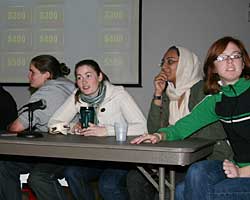The
Jeopardy of Global Warming

The Smith student team considers an answer during Global
Warming Jeopardy! |
Teams of Smith administrators,
faculty, staff and students competed yesterday in a game
of Jeopardy with a twist. As part of Smith’s daylong
Focus the Nation participation on January 31, contestants
fielded questions on sustainability and the environment
during “The Planet in Jeopardy," a game fashioned
after TV's Jeopardy! Following
the format of the long-running television quiz show hosted
by Alex Trebek, the game was hosted by local commentator
Robert Shycon. It took place in the Campus Center Carroll
Room. After a hard-fought battle of wits, the Smith faculty
team racked up the most points. The event was coordinated
by the Office of Events Management.
How is your Global Warming
IQ? See how you would have fared with this
sampling of clues given during the event.
Clue: Energy resources like wind, hydro,
solar, geothermal, and biomass that are replenished in a
short period of time and will never run out.
Clue: Energy
generated by heat stored beneath the earth’s surface.
Clue: This major polluter accounts for
about 17% of U.S. greenhouse gas emissions.
Clue: It’s
the biggest part of your home energy bill.
Clue: The energy equivalent of flossing
your teeth, this often-ignored action saves energy and lengthens
the life of your HVAC system.
Clue: An alternative fuel made primarily
from soy or palm oil or from recycled vegetable oil.
Clue: For
this resource, it’s the
point at which maximum production is reached and further
production declines as the cost rises.
Clue: A biofuel alternative to gasoline
primarily made from corn or sugar cane that requires more
energy to make than if gives back when burned.
Clue: Energy
from plants or animal products that have been grown recently.
Daily Double Clue: The
United States is the number one consumer of oil, but it ranks
below how man other countries in oil reserves?
Clue: Shopping
locally, then regionally, or from a business that’s
locally-owned somewhere else in the world before you buy
from a big-box store.
Clue: The practice of paying a fair price
to farmers for their products, rather than leveraging purchase
power to drive down the price.
Clue: Selling
shares of farm products at the beginning of the season
to finance the farming and giving each shareholder a portion
what’s grown.
Clue: It may say fresh, but most U.S. produce
is picked in this range of days before it reaches your supermarket.
Clue: It’s
often only tap water with a pretty label, but bottled water
costs about how many times as much as gasoline?
Clue: The practice of not buying things
you have to throw away, recycling things you no longer
use, and composting all waste food and paper so that you
move toward reducing the waste you produce to nothing.
Clue: It’s in your facial scrub,
it’s 50 percent or more of marine waste, and it’ wounds,
strangles, traps, or starves more than one million birds
and 100,000 marine mammals every year.
Clue: The controlled decomposition of food
and plant wastes into the soil-like material called humus.
Clue: The practice of manufacturing goods
without sending anything to a landfill.
Daily Double Clue: It’s
the third largest part of the U.S. waste stream.
Clue: This theory, now a common term,
holds that the amount of the substance in any region is
finite, so the rate of discovery must reach a maximum and
then decline.
Clue: Water
vapor, carbon dioxide, tropospheric ozone, nitrous oxide,
and methane that trap heat within the earth’s atmosphere.
Clue: A 1997 United Nations initiative
that involved legally binding reductions on carbon emissions
signed by 169 countries, but not the US.
Clue: If current trends continue to build
on one another, the Artic region may experience its first
summer with no sea-ice by what year?
Clue: These
may go from rare to extinct because they can’t go
any farther north.
Clue: Term used to describe creating energy
by conservation, rather then by generating more watts
Clue: The acronym for how much energy it
took to produce the energy you get from an energy source.
Clue: A
meter that measures the amount of energy that a specific appliance
or device draws so you can identify energy hogs.
Clue: More
than 70% of its energy is wasted as heat; what’s
left over is what helps you see.
Clue: Coal, natural gas, petroleum, nuclear,
hydroelectric, biomass, and imported power are all used to
generate electricity. Within five points, what percentage
of that generation is wasted and never distributed?
Clue: A logo and label system that tells
you whether a product meets or exceeds the U.S. standards
for efficient energy use.
Clue: It’s produced without the use
of sewer-sludge fertilizers, most synthetic fertilizers and
pesticides, genetic engineering (biotechnology), growth hormones,
irradiation and antibiotics, but it’s not natural.
Clue: This program includes only those
that are grown, harvested, and made into products, such as
paper, under strict rules.
Clue: You can be silver, gold, platinum,
or simply certified according to the standards of this measurement
system.
Clue: This
substance is more environmentally friendly, available in
brighter colors, improves the life span of the printers,
makes it easier to recycle paper, is more economic in the
long run—and lowers workers’ exposure
to hazardous chemicals.
Clue: A change in rules in the 1970s helped
save this species, but its habitat, hunting grounds, and
nesting areas may disappear within the next four decades.
|























